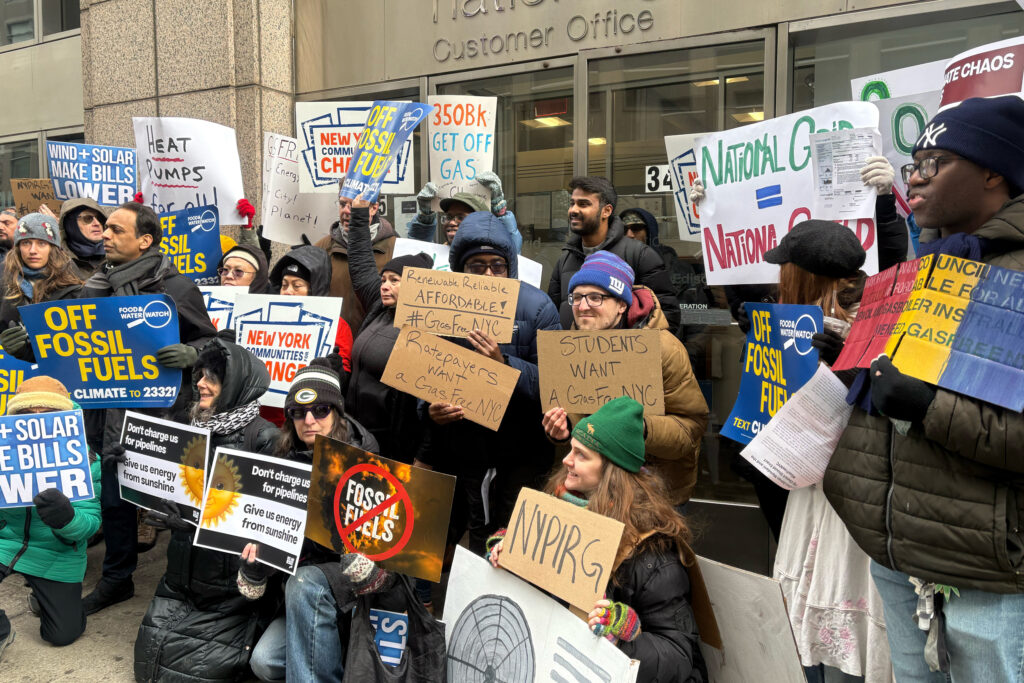Gaslighting: Fifth in a series about opposition to a wave of new natural gas pipelines, power plants and storage facilities on the drawing board in North Carolina.
Listen to an audio version of this story below.
CLINTON, N.C.—Sherri White-Williamson rode down Main Street here a week before Christmas, past the mom-and-pop bakery, an oldies AM radio station and a cozy coffee shop. From the car’s passenger seat, she glanced at an empty glass storefront in the heart of town where in the 1950s and ‘60s, she shopped for clothing. It was one of only two places where Black people could not only buy clothes but also try them on.
Today there is a different Clinton, a different Sampson County than that of 60 years ago. It’s now integrated, but with landfills, industrialized hog farms and a wood pellet plant that belie it being an environmentally just place.
White-Williamson is 72, with close-cropped hair and an intentional way of walking that says she is on her way somewhere to do something important for someone. She worked in the U.S. Environmental Protection Agency’s Office of Environmental Justice during the George W. Bush and Obama administrations, graduated from Vermont Law School in 2018 and returned home to Clinton, where she co-founded the nonprofit Environmental Justice Community Action Network—EJCAN—almost five years ago.
White-Williamson sits on the Governor’s Environmental Justice Advisory Council, established by Democratic Gov. Roy Cooper in a 2023 executive order. The council leadership recently reassured its members that it would continue under Gov.-elect Josh Stein, also a Democrat, until at least 2027. She feels relieved that for a while at least one branch of state government will remain committed to environmental justice.
For environmental advocates in North Carolina, 2024 has been a slog. The state’s massive climate-altering natural gas expansion—pipelines, compressor stations and new power plants—continued unfettered, as state regulators routinely approved permits for the projects.

Now White-Williamson and her fellow activists are bracing themselves for a one-two punch by the new Trump administration and state lawmakers. They wonder if Trump will ramp up fossil fuel production, stymie offshore wind installations and cancel clean energy and environmental justice projects, funded by the Inflation Reduction Act.
That includes $156 million for the Solar for All Program focused on disadvantaged communities in North Carolina, like those in Sampson County. Attempts by the Trump administration to claw back those funds would probably be challenged in federal court. But White-Williamson needs to only reflect on her own history to know she shouldn’t rely on the courts for justice.
“Those people are going to try everything under the sun to take this money back, even if it means going to the U.S. Supreme Court,” she said. “Because they do not want this money to end up in these communities.”
In North Carolina, Republicans will lose their supermajority in the state legislature in January, but still control both chambers and hold immense political power. They recently wielded it by passing Senate Bill 382—and overriding a veto—with critical implications for energy and the environment: The legislation will change the composition of key environmental boards, like the Utilities Commission, prop up the swine biogas industry and strip the governor and attorney general, both Democrats, of some of their power.
White-Williamson often leads groups, sometimes by the busload, on “toxic tours” of her community and shows them what’s missing from the local chamber of commerce brochures. The community members who come out to talk with the visitors are the most important part of the tours, she said. Hearing about the lived experience of residents leaves an indelible impression on the visitors.
“I don’t know if ‘awakening’ is an appropriate word, but I’ve heard that for most of them who come, especially if they were on a bus with a bunch of people, that they talk about what they saw all the way back, because they can’t imagine that all of this stuff is in one place,” White-Williamson said.


Sampson County is home to 2.1 million hogs, state records show, but only 59,000 people, a ratio of 36 swine per capita. Swine waste-to-biogas digesters are starting to take hold on the county’s massive industrial hog operations, euphemistically known as concentrated animal feeding operations, or CAFOs. The biogas digesters require a CAFO to cover one of the unlined football-field size lagoons to capture methane and inject it via pipeline to a natural gas conditioning facility many miles away.
But that still leaves one lagoon, reserved for “overflow,” uncovered, emitting methane, ammonia and other harmful pollutants. Even with the digesters, the system required to dispose of hog waste still relies on sprayfields where feces and urine are sprayed on adjacent farm fields as fertilizer. The sprays sometimes mist neighboring homes and can contaminate the groundwater when it falls to the earth.
It was around this time of year in 2018 when a federal jury awarded a total of $100,000 to eight Sampson County residents who had sued Murphy-Brown, a subsidiary of Smithfield Foods, for nuisance.
The putrid odor, truck traffic at all hours of the night, flies, vultures, dead boxes–essentially a dumpster for deceased hogs–had infringed on the residents’ ability to use and enjoy their property.
Then there’s the Sampson County landfill, whose enormous mound is visible from N.C. Highway 24 and sits in the middle of Snow Hill, a predominantly Black community. The Southern Coalition for Social Justice conducted research for EJCAN and found that since 2005 the landfill has accepted trash from 73 North Carolina counties. Federal and state records show it ranks second in the U.S. for the emission of methane—a climate super pollutant 80 times more potent at warming the atmosphere than carbon dioxide—and first in the state in releases of vinyl chloride, exposure to which can increase the risk of liver, brain, lung and blood cancers.
Climate change is a regular visitor to Sampson County. The weather vacillates between stultifying heat and deep droughts to biblical rains. It routinely gets hammered by tropical storms and hurricanes, like Matthew and Florence, whose floodwaters inundate waste lagoons, contaminate drinking water wells and destroy homes, especially in the low-lying areas where whites historically sequestered Black people to live.
EJCAN’s office is in a brick building near central Clinton that once housed a law firm. A few days before Christmas, a light breeze blew in from the north, lifting the odor of manure over the nearby auto body shop before settling in the parking lot.
Live in Sampson County long enough, like White-Williamson, and you can distinguish among stenches: the landfill, hog waste or poultry farms.
If the odors were music, the landfill is a relentless backbeat. Chicken and turkey waste smell like a falsetto. Hog waste lingers in the background, like white noise.
“Poultry smell is a bit more intense, piercing, yes, that’s a good word for it,” she said. “Whereas hog odor, it doesn’t really slap you in the face but you know that’s what it is. And the landfill, well, it’s the landfill.”
For decades, neighbors had complained of the smell, trucks and polluted drinking water wells, whose contaminants they say originated from the unlined part of Sampson County landfill.
With help from the Southern Environmental Law Center, EJCAN threatened to sue GFL Environmental Inc., the landfill owner. White-Williamson thought GFL would surely engage in a protracted legal fight, that justice would be years away. But within months, GFL relented and as part of a consent agreement is building a community center and agreeing to fund air and water testing as part of a Community Benefits Agreement.
Lately, residents have noticed the landfill is stinking less often.
Along the outskirts of Clinton, White-Williamson noted where miles of natural gas distribution lines had recently been buried. The local paper reported the new pipelines were merely replacing older ones.
White-Williamson is skeptical. Many community members don’t trust the county, or the pipeline companies, to tell them the truth. They still have questions about a venture between Smithfield Foods and Dominion Energy called Align RNG, to transport biogas through 30 miles of underground pipeline in Sampson and Duplin counties. It’s been four years, yet the company has never publicly disclosed the pipeline routes, and state environmental regulators haven’t compelled it to do so.
White-Williamson stopped at Elizabeth’s Pecans to buy some brittle for her staff. The shop sits across N.C. Highway 24 and the railroad from Montauk Renewables, which bought a vacant Bay Valley Foods warehouse for its biogas project. As soon as next year the company plans to truck in tons of swine waste per day that will use methane gas to convert to electricity and sell to the local electric co-op.


Gray pipes belonging to Piedmont Natural Gas, a subsidiary of Duke Energy, poke from the ground near the rail line. From the pecan shop parking lot, White-Williamson paused and tilted her head. She heard a high-pitched whisper in the pipes. It was the hissing of natural gas.
Waiting for a Ruling
By mid-December, a month had passed since Anne Harvey had stood before a Person County judge, arguing a case she felt that with a close reading of the law, she would win.
It was a zoning case in a rural corner of the county, but one with enormous implications for the natural gas buildout in North Carolina.
The Person County Courthouse in Roxboro is more than 90 years old, built in Neo-Classical Revival style with 20-foot ceilings, golden chandeliers and rectangular windows that paint the courtrooms with pillars of light.
Two weeks after the election, on a warm fall day in Superior Courtroom No. 2 and at precisely 10 o’clock, a slow parade of civil cases passed before Judge John Dunlow: A loose dog had mangled the ear of a middle school-aged boy. An elderly man, breathing with the aid of an oxygen tank, owed money to the county for cleaning up his junkyard. A victim of a car wreck.
Then there was Harvey, a chief attorney at the nonprofit Southern Coalition for Social Justice. Harvey is 41, short, with blonde hair and blue eyes. A former ocean scientist, she wore a dark suit. She and her small team of lawyers sat on a hard wooden bench toward the back.


They were representing eight neighbors of the Moriah Energy Center, the 25-to-50 million-gallon liquified natural gas plant that Enbridge is building in southeastern Person County. They were suing the Person County Commissioners, arguing the officials had “arbitrarily and capriciously” rezoned 485 acres of land for the facility. In response, attorneys for the county and Enbridge had asked Judge Dunlow to dismiss the case.
Construction on the LNG plant had already begun. Complaints to the state about dirt from the site entering nearby streams had gone nowhere. The state had issued an air permit to Enbridge.
This was the last legal card the neighbors had.
Harvey found it enervating, waiting for hours in the courtroom before getting her chance to stand before the judge. She knew she had mastered the legal arguments of the case, but they still spun in her mind like a tire mired in sand.
Destroy the rural character of their neighborhood and Person County … and subject the Plaintiffs to all the ills that come from having a large liquified natural gas storage and distribution facility near their properties … increased pollution, noise, traffic, endangered and threatened species impacts, water resource impacts …
Finally, at 2 o’clock in the afternoon, it was her turn.
The judge seemed attentive. She felt like her arguments went well: The rezoning didn’t include natural gas facilities as a permitted use. The county had failed to notify all of the adjacent property owners, as legally required. That included Camp Butner, a federal weapons training range, which is less than five miles from the Moriah Energy Center.


Attorneys for the county rebutted, arguing that the military should have personnel whose responsibility is to monitor zoning developments in the area.
Harvey remembers looking at her colleagues. That can’t be the answer.
Now, six weeks later, with the holidays upon her and the activist community preparing for Trump’s return, Harvey read through a ruling Judge Dunlow had just issued.. While the judge acknowledged that the county had failed to properly notify one of the eight plaintiffs, he nonetheless granted all of the county’s motions to dismiss the case.
Harvey initially felt discouraged. She and her legal team had given it their all, even in the face of the fossil fuel industry’s immense power.
A week later, with time to reflect, Harvey had bounced back. She could see the connections between each part of the enormous natural gas buildout in North Carolina.
“The Person County case is so interesting because it’s a microcosm for the rest of the South and probably the rest of the country,” Harvey said. “We have this confluence of the natural gas storage facility, which is just this tiny part that is in my world, but it’s right there next to the new natural gas plants at Hyco Lake, the existing coal plant, the pipelines, the ‘megasite.’”
For Harvey, the natural gas expansion, at least in North Carolina, seems to track with the expansion of data centers. Person County officials haven’t disclosed what Microsoft will build at the ‘megasite’ near Duke Energy’s Hyco Lake power plants, but the description—proximity to immense amounts of energy but few jobs—sounds like a data center.
“There are all these incentives right now to lure data centers or larger companies and energy users to these rural areas,” she said.
Harvey could feel how badly she needed the holiday to rest. Then, she figured, she could look at the case again with fresh eyes, talk to her clients and consider whether to appeal.
“Shame, Shame, Shame”
Dan Crawford tramps through the halls of the state legislature as if on patrol, just weeks after state House and Senate Republicans made use of their soon-to-vanish supermajority and rammed Senate Bill 382 through both chambers—and overrode Gov. Cooper’s veto.
The director for governmental relations at the N.C. League of Conservation Voters, Crawford is a husky, garrulous man in his 40s, who often wears a green tie and soft-soled shoes. Years of walking the hard floors and long corridors of state government, logging enough miles to travel halfway around the Earth, has taken a toll on his ankles and knees.


Crawford grew up in the mountains near Asheville, a majestic area flattened in September by Hurricane Helene, a historic storm supercharged by climate change. As he makes the rounds of legislative offices, he’s thinking of ways to persuade state lawmakers that wetlands, rivers and forests are worth protecting, that climate change is happening right now, to understand the environment’s value beyond a balance sheet.
It’s hard work, freaking hard work, he said, although he usually uses a spicier term. Sometimes he ducks into the office of his wife, Democratic state Rep. Sarah Crawford, for a breather.
The prospect of a Trump administration worries him. Crawford sees how the president-elect has promised to roll back climate protections and environmental rules, and to stack the courts with sympathetic judges.
“Whatever the polluters want, they’re going to get,” Crawford said a few days before Christmas. “There’s no telling how far they will go to undo regulations—a burden as they call it. But we like to think of them as protecting the natural beauty of our country, and protecting the air citizens breathe and the water they drink.”
As of January, Republicans will no longer hold a super-majority, which means there’s a chance Democratic Gov. Josh Stein’s future vetoes will survive. But just two weeks after the election, in the lame-duck session, Republicans seized the moment and pushed through their power grab.
On Nov. 19, Republican lawmakers resurrected Senate Bill 382 from legislative purgatory. What had been introduced in March 2023 as a slim bill to amend dental practice regulations transmogrified into a 132-page omnibus measure, ostensibly to fund Helene disaster recovery.
The bill did include $252 million for Helene, a sliver of the estimated $53 billion in damages the storm incurred. But its primary purpose was to strip power from the governor and attorney general, both Democrats, endowing the state auditor with the authority to appoint the state board of elections, and giving appointment power to the state treasurer for the utilities commission.
The attorney general’s office could no longer automatically intervene in cases before the utilities commission, instead having to get the body’s approval like anyone else.
Both chambers, except for most Democrats and a few GOP holdouts from the mountain counties, passed it the next day. Gov. Cooper vetoed the bill.
In mid-December, Crawford and his wife were on the West Coast when Republicans announced they would vote to override the governor’s veto. State Rep. Crawford took the red-eye back to Raleigh to vote in hopes of sustaining it. Hundreds of angry protesters crowded the House Chamber on Dec. 11 when lawmakers returned to override the veto. They shook their fists and shined flashlights onto the House floor.
“Shame, Shame, Shame!”
A voice blared through the public address system: “If you do not leave the building at this time you will be placed under arrest.”
“People’s house! People’s house!”
State Capitol Police ousted the demonstrators and arrested one person.
The override succeeded. Senate Bill 382 is law.
The state treasurer-elect, Republican Brad Briner, will now appoint one of the five members of the Utilities Commission whose term expires this June. That seat was previously under the purview of the governor, who now has two appointments instead of three.
As the natural gas buildout continues, the new commissioner will participate in key decisions about North Carolina’s energy future.
Briner didn’t respond to an email from Inside Climate News about his new authority, but David Neal, a senior attorney at the Southern Environmental Law Center, said it could present a conflict of interest.
The state treasurer’s mandate is to maximize the value of the pension fund. If the state invests in utility stocks, then Briner could confront an ethical crossroads in his commission appointment, Neal said. “I don’t know if Briner will have to make sure none of our state investments include Duke Energy stock before he can ethically make that recommendation,” Neal said. “There are a lot of open questions here.”
The state’s pension fund does invest in several utility stocks involved in the natural gas buildout in North Carolina, according to state and federal records: Duke Energy, which plans to build four new natural gas plants in Person and Catawba counties. Dominion Energy, which this year sold its gas assets, including the T15 pipeline and the Moriah Energy Center, to Enbridge, a Canadian company. And Williams, which owns the Transco pipeline and compressor stations that are expanding in a half dozen counties.
As of Dec. 20, the state’s investment was worth $340 million, according to the treasurer’s office.
Crawford has a little over two weeks’ rest before lawmakers reconvene. In early January, he’ll return to the legislature, its stale air, hard floors and closed doors. He wants lawmakers to see the connection between their votes and the climatic changes that are devastating their districts.
Swaths of western North Carolina are still reeling from Helene, and likely will be for years, if they ever fully recover.


Even on the coast, in Brunswick County, damage remains from another September storm, Tropical Cyclone Eight. On the flipside, rainfall recently has been hard to come by in all 100 counties, which range from abnormally dry to a moderate drought.
Crawford wants elected officials to understand that unless the state is willing to spend significant sums on resiliency, these catastrophes will become the rule, not the exception.
“We can’t bury our heads in the sand anymore, because it’s happening now,” Crawford said. “We’ve got to do something now if we want to have a fighting chance.”
Far From Lost
Days before the December holiday break, Mary Maclean Asbill, the director of Southern Environmental Law Center’s North Carolina offices, packed boxes for a move to new digs down the block in Chapel Hill. It was tempting to see bare bookshelves, legal tomes stacked in hallways and a drooping houseplant as a metaphor for the climate movement on the eve of Trump’s return.
But for Asbill, and her colleagues in North Carolina, all was far from lost.
Although Trump beat Kamala Harris in the state by 3 percentage points, North Carolina voters elected Democrats Josh Stein as governor and Jeff Jackson as attorney general and picked up one seat in the state House, depriving Republicans of their super-majority necessary to overturn the governor’s vetoes.
Provided the Democrats can thwart any party defections—state Rep. Tricia Cotham switched to a Republican last year, giving the GOP a supermajority—SELC and other advocates have a better chance of heading off harmful legislation. That could include the weakening of environmental protections and safeguards during the long-term cleanup after Hurricane Helene.
A graduate of UNC Chapel Hill and the University of Georgia School of Law, Asbill is in her 50s, with short blonde hair and brown eyes, and a wry sense of humor. Like Crawford, she spends many of her days traipsing through the legislature, listening to the scuttlebutt and observing committee meetings, where she has seen plenty of bad bills in her 13 years with SELC’s North Carolina office: an onshore wind energy moratoria, now expired; lax rules over natural gas; bills friendly to CAFOs, the hollowing out of public records law as it applies to state lawmakers.
This story is funded by readers like you.
Our nonprofit newsroom provides award-winning climate coverage free of charge and advertising. We rely on donations from readers like you to keep going. Please donate now to support our work.
Donate Now
“We’re excited that the super-majority is gone in the House,” she said. “I know it’s just by a razor’s edge, but we’re hopeful some of the craziest ideas won’t get floated at the legislature. We can hope, right?”
A Fight to Come
The year ahead could be one of the hottest globally on record, according to forecasts by the World Meteorological Office, just behind 2024 and 2023, when global carbon dioxide emissions reached 420 parts per million, far above what scientists believe is the “safe” upper limit of 350 ppm.
Michael Mann and other leading climate scientists say current policies put the planet on track for approximately 2.7 degrees Celsius—nearly 5 degrees Fahrenheit—peak warming by 2100. “We are on the brink of an irreversible climate disaster,” the scientists wrote in their 2024 State of the Climate Report released last month. “This is a global emergency beyond any doubt. Much of the very fabric of life on Earth is imperiled. We are stepping into a critical and unpredictable new phase of the climate.”
In North Carolina, those alarming developments aren’t stopping Enbridge from building the Moriah Energy Center in Person County. The Transco and MVP Southgate pipelines will proceed, with a new Trump appointee on the Federal Energy Regulatory Commission later this year. And Duke Energy’s proposed natural gas plants will move forward, permits in hand, enabling the company to blow past its deadline to reduce greenhouse gas emissions by at least five years.
At the same time, the Biden administration’s progress on environmental justice could be reversed. Project 2025, a blueprint for President Trump’s next term, would eliminate the stand-alone Office of Environmental Justice and External Civil Rights and park it within the office of the EPA Administrator, whose nominee is Lee Zeldin. Zeldin has promised to support the Trump administration’s fossil fuel agenda, which includes weakening environmental regulations over the energy industry.
And North Carolina law prohibits state agencies and the legislature from enacting rules and statutes that are more stringent than federal laws. As goes the EPA, so goes North Carolina.
That leaves the state and its Democratic governor to try to advance clean energy and environmental protections, possibly through executive order, even as the other two branches of state government—the legislature and the courts—–are still dominated by Republicans whose history has been to weaken, not strengthen, these laws.
And yet no outcomes are a certainty in a nation, and a state, so bitterly, but narrowly, divided. The activists like Harvey, in Person County, and White-Williamson, on Main Street in Clinton, will have their day in court.
Sometimes the activists win.
In the aftermath of Hurricane Helene, Asbill’s colleagues at the Southern Environmental Law Center office in Asheville sued the U.S. Army Corps of Engineers, U.S. Fish & Wildlife Service and the U.S. Forest Service for allowing the railroad company CSX Transportation to mine gravel from the Nolichucky River to repair train tracks damaged by the storm.
The river runs through western North Carolina and eastern Tennessee.
The agencies responded by ordering CSX to stop mining and remove heavy machinery from the river until the company receives the appropriate environmental permits.
“There are a lot of species in that river and it’s a big kayaking and whitewater river, which is very important to the revenue of this little town,” Asbill said. “We certainly don’t want to impede progress. But we want things to be done resiliently and right, and not further ruin a river that’s already suffered so much from the storm.”
About This Story
Perhaps you noticed: This story, like all the news we publish, is free to read. That’s because Inside Climate News is a 501c3 nonprofit organization. We do not charge a subscription fee, lock our news behind a paywall, or clutter our website with ads. We make our news on climate and the environment freely available to you and anyone who wants it.
That’s not all. We also share our news for free with scores of other media organizations around the country. Many of them can’t afford to do environmental journalism of their own. We’ve built bureaus from coast to coast to report local stories, collaborate with local newsrooms and co-publish articles so that this vital work is shared as widely as possible.
Two of us launched ICN in 2007. Six years later we earned a Pulitzer Prize for National Reporting, and now we run the oldest and largest dedicated climate newsroom in the nation. We tell the story in all its complexity. We hold polluters accountable. We expose environmental injustice. We debunk misinformation. We scrutinize solutions and inspire action.
Donations from readers like you fund every aspect of what we do. If you don’t already, will you support our ongoing work, our reporting on the biggest crisis facing our planet, and help us reach even more readers in more places?
Please take a moment to make a tax-deductible donation. Every one of them makes a difference.
Thank you,

















